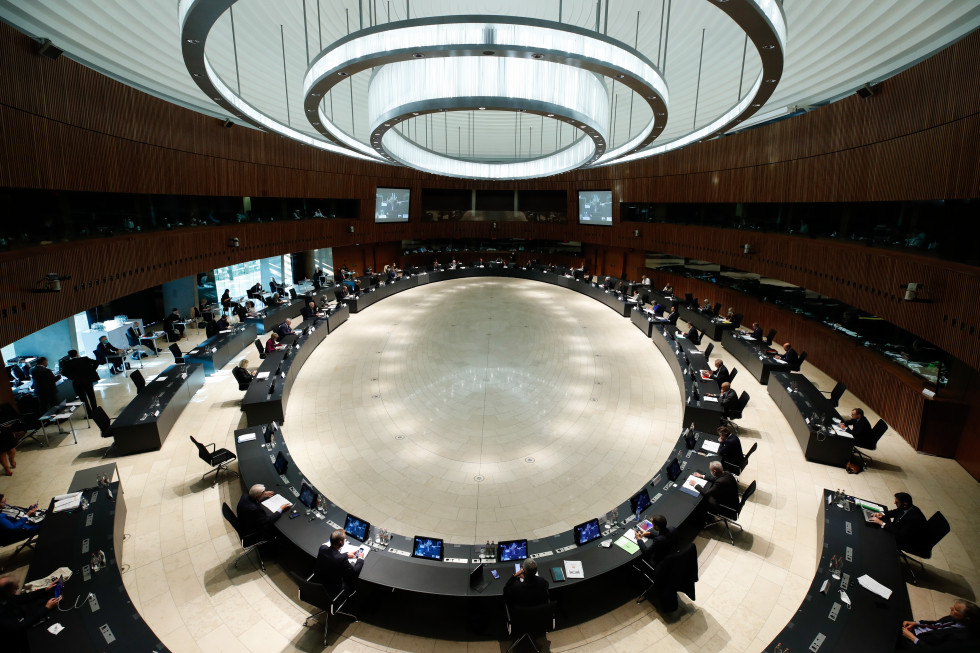By: UKOM
During a working lunch in the framework of the EU Home Affairs Council meeting, EU ministers of the interior held an open discussion about the current situation regarding the implementation of interoperability (connectivity of information systems) in the member states, which should be concluded by 2023. So far, we have done a lot of work at EU level and in the member states on this major project for the interconnectivity of justice and home affairs information systems.
‟Due to some delays in testing the upgraded Schengen Information System and the Entry/Exist System at the central level, the ministers agreed that EU-Lisa should prepare a more detailed analysis by the December meeting and, if necessary, propose a new timeline for the establishment of the project,” said Minister Hojs, while stressing the importance of IT systems connectivity for the provision of a higher level of security in the EU. “It is essential that all member states be ready at the same time to make the systems interoperable,” Hojs concluded.
Migration was another issue on the agenda of today’s Council of the EU meeting of the ministers of the interior in Luxembourg, chaired by the current holder of the Presidency of the Council of the EU, Slovenian Minister of the Interior Aleš Hojs. The ministers addressed the challenges of screening third country nationals on the external EU borders. Negotiations on the screening regulation, which constitutes a part of the Pact on Migration and Asylum, are intensively underway in the EU Council, also ensuing from the political signal sent by the ministers of the interior during their informal meeting in Brdo pri Kranju in July. The Minister told his colleagues that no regulation that might be excluded from the overall package would prejudge the conclusions on the overall migration and asylum pact. ‟After today’s discussion, in which many have stressed the importance of the package approach, it would appear that there is still a lack of political will in order to achieve major progress on the regulation. The work will now continue at the technical level to formulate new compromise proposals to maximise progress. As a union, we have to be prepared for the challenges at the external borders as soon as possible and to the greatest extent,” Minister Hojs added.
The ministers also held a long discussion on the current migration situation in the EU. ‟The situation is not only difficult on our eastern borders, the issue we discussed at the meeting in the scope of the IPCR mechanism in August, but virtually all the countries at the external EU borders are experiencing pressure,” Minister Hojs described the situation. We will continue to monitor the situation in cooperation with the EU agencies, while we also intensively continue the negotiations on the new Pact on Migration and Asylum. ‟While lengthy negotiations on the legislative proposals are underway, we can already do more today to improve cooperation with third countries regarding returns of migrants who cross borders illegally and are not entitled to international protection. There are several tools available and we must not forget the specific requirements and particularities of each member state experiencing pressure,” the Minister summarised the discussion.
The Council of ministers also took note of the current situation in Afghanistan and the response so far regarding the joint statement adopted by the ministers of the interior at the informal meeting in August. The ministers confirmed their support for the Counter Terrorism Action Plan. “The plan provides a good framework for further activities; these will continue regarding all aspects of the joint statement.” The Presidency will continue to follow the developments and inform the Council on the next review of the situation at the next meeting in December.
One of the issues being addressed in the framework of several forums and discussed by the ministers at today’s Council of the EU meeting is the prevention of the sexual abuse of children, one of the priorities of the Slovenian Presidency, in the scope of which the ministers addressed the digital dimension of investigating child sexual abuse. They underlined the importance of adequate data access for law enforcement authorities and advocated for a stronger role of social media, hosting services and electronic communications services in the protection of children and the prevention of the circulation of child sexual abuse content. ‟I told the ministers that in mid-November we are organising a special ministerial meeting at Brdo pri Kranju on this pressing issue, which represents one of the most despicable human acts, and I invited my colleagues to Slovenia,” the Minister concluded.
Source: gov.si

